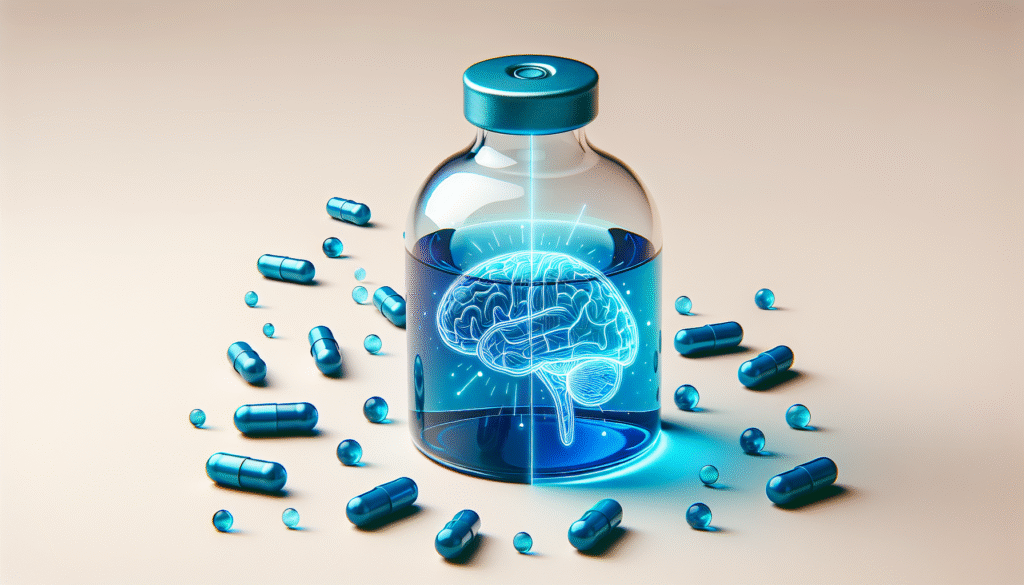
What if a single compound could enhance your cognitive abilities and improve overall brain function? Increasingly, individuals seeking cognitive enhancement have turned their attention to Methylene Blue. This intriguing substance has a storied history in medicine and science, and it is now being explored for its potential benefits in cognitive performance.

What is Methylene Blue?
Methylene Blue is a synthetic compound that was first created in the late 19th century. Originally used as a dye and an anti-malarial agent, it has since found applications in various medical and scientific settings. Chemically, it is known as methylthioninium chloride and is categorized as a phenothiazine derivative.
What sets Methylene Blue apart is its multifaceted role in biological systems. Not only does it function as a dye, but it can also interact with various cellular processes, leading researchers to examine its potential applications beyond traditional roles.
Historical Context
Methylene Blue has been used for more than a century in medical practice. Its use as an antiseptic during World War I and its role in treating methemoglobinemia—a condition where hemoglobin is altered and fails to effectively transport oxygen—are significant highlights in its history.
The compound’s appeal in various therapeutic contexts has prompted continued research. In recent years, growing interest in cognitive enhancement has led scientists to investigate how Methylene Blue may influence brain function and memory.
Biological Mechanism of Action
Understanding how Methylene Blue works involves delving into the biological mechanisms it engages.
Electron Transport Chain
One primary way that Methylene Blue impacts cellular function is through its role in the electron transport chain, a series of complexes found in mitochondria that are essential for ATP production:
-
Cyclic REDOX (Reduction-Oxidation): Methylene Blue can serve as an electron donor or acceptor, facilitating the transfer of electrons. This property enables it to enhance mitochondrial function, leading to improved energy production and cellular health.
-
ATP Production: By improving the efficiency of the electron transport chain, Methylene Blue can increase cellular adenosine triphosphate (ATP), the energy currency of cells. Enhanced ATP production can, in turn, influence cognitive processes such as memory and learning.
Neuroprotection
Methylene Blue exhibits neuroprotective characteristics that can potentially safeguard brain cells from damage or degeneration:
-
Antioxidant Activity: The compound may help combat oxidative stress, a condition that leads to cellular damage. By reducing oxidative stress, Methylene Blue could preserve neuronal integrity and function.
-
Anti-inflammatory Effects: Inflammation often contributes to cognitive decline. Methylene Blue’s anti-inflammatory properties suggest it may help alleviate neuroinflammation, further protecting brain cells.
Enhancing Mitochondrial Function
Mitochondrial health is crucial for overall cognitive function. As discussed earlier, Methylene Blue enhances mitochondrial efficiency and ATP production. This has significant implications for cognitive performance. With better energy supply, brain cells can operate at optimal levels, which could manifest as improved attention, memory retention, and learning capabilities.
Cognitive Enhancement
What constitutes cognitive enhancement? At its core, cognitive enhancement refers to the improvement of intellectual performance. This may include areas such as attention, memory, problem-solving skills, and overall mental clarity.
Mechanisms of Cognitive Improvement
Research indicates that Methylene Blue may influence cognitive performance through various mechanisms, including:
-
Memory Formation: Improved mitochondrial function can boost memory formation by providing the necessary energy for synaptic plasticity, crucial for learning and memory processes.
-
Concentration and Focus: The neuroprotective effects of Methylene Blue may enhance mental clarity and concentration by reducing distractions caused by neurodegenerative processes.
-
Mood Enhancement: Some studies suggest that Methylene Blue may even influence mood, as improved cognitive function can lead to better emotional regulation and mental well-being.

Research Findings
Numerous studies have investigated the cognitive effects of Methylene Blue. While much of the research is still in the preliminary stages, findings offer promising insights:
Animal Studies
Animal studies have revealed compelling results regarding Methylene Blue’s effects on cognition. Research has demonstrated that administration of Methylene Blue led to improvements in memory and learning in rodents. These studies help pave the way for understanding its potential in human applications.
Human Studies
Human clinical trials are less numerous, but several have noted positive cognitive effects. In a small study, Methylene Blue was associated with improved working memory performance in adult males. Additionally, other research indicates that low doses of Methylene Blue can enhance cognitive function in older adults, suggesting its potential use in counteracting age-related cognitive decline.
Limitations of Research
While the initial results are promising, it is important to approach the current research with caution. Many studies involve small sample sizes or lack rigorous controls. Further comprehensive trials are necessary to establish definitive conclusions regarding Methylene Blue’s efficacy and safety for cognitive enhancement.
Safety and Side Effects
As with any supplement or medication, it is crucial to consider safety and potential side effects before pursuing Methylene Blue as a cognitive enhancement option.
Common Side Effects
Methylene Blue is generally considered safe when used in appropriate doses. However, some users may experience side effects, including but not limited to:
-
Gastrointestinal Distress: Nausea, vomiting, and diarrhea are potential side effects that can arise when dosages exceed recommended levels.
-
Skin Reactions: Allergic reactions, including skin rashes and irritation, may occur in some individuals.
-
Urine Discoloration: Methylene Blue can cause a harmless bluish tint to urine, which can be disconcerting but is not a cause for concern.
Contraindications
Individuals with certain medical conditions should approach Methylene Blue with caution:
-
G6PD Deficiency: Individuals with glucose-6-phosphate dehydrogenase (G6PD) deficiency may be at risk of hemolytic anemia when exposed to certain oxidative agents, including Methylene Blue.
-
SSRI Interactions: Methylene Blue can interact dangerously with selective serotonin reuptake inhibitors (SSRIs), potentially leading to serotonin syndrome, a serious condition that can occur with elevated serotonin levels.
Dosage Recommendations
When considering Methylene Blue for cognitive enhancement, dosage is a critical factor. Current research suggests that lower doses, typically in the range of 0.5 mg to 4 mg per kg of body weight, may be most effective for cognitive benefits while minimizing the risk of side effects.
Suggested Protocol
-
Start Low: If you choose to try Methylene Blue, begin with the lowest possible dose to assess your body’s reaction.
-
Monitor Effects: Keep a journal of changes in cognitive function, mood, and any side effects experienced to evaluate the compound’s impact.
-
Consult Healthcare Professionals: Always consult with a healthcare provider before starting any new supplement, especially if you have pre-existing health conditions or are taking other medications.
Alternative Cognitive Enhancers
While Methylene Blue is a fascinating option for cognitive enhancement, it is not the only one. Several other substances have garnered attention in the realm of cognitive optimization:
Nootropics
Nootropics are a class of cognitive enhancers that include both natural and synthetic substances. Popular examples include:
- Bacopa Monnieri: An herbal supplement known for its potential memory-enhancing properties.
- Rhodiola Rosea: An adaptogen reputed to improve mental performance under stress.
- Lion’s Mane Mushroom: A natural nootropic that may promote nerve growth and cognitive function.
Lifestyle Factors
In addition to supplements, certain lifestyle choices can also enhance cognitive function:
-
Nutrition: A balanced diet rich in antioxidants, omega-3 fatty acids, and essential vitamins is crucial for maintaining optimal brain health.
-
Exercise: Regular physical activity is associated with improved cognitive function, as it promotes blood flow to the brain and stimulates neurotransmitter production.
-
Sleep: Adequate sleep is fundamental for memory consolidation and cognitive performance. Prioritizing quality rest can have profound effects on your mental acuity.
Conclusion
Methylene Blue presents an intriguing avenue for cognitive enhancement that merits further exploration. Its multifaceted biological mechanisms, historical usage, and emerging findings suggest it could offer cognitive benefits for some individuals. However, caution is warranted, given the current limitations in research and the potential for side effects.
As with any intervention aimed at cognitive improvement, you must remain informed and approach options thoughtfully. Consulting healthcare professionals and considering a holistic approach that includes lifestyle changes may ultimately enhance cognitive performance more effectively than singular supplements alone.
With continued research and a better understanding of this compound, Methylene Blue could play a fascinating role in the future of cognitive enhancement. Whether or not it proves to be the game-changer many hope for, it undoubtedly opens up discussions on the intersection of science, wellness, and human potential.